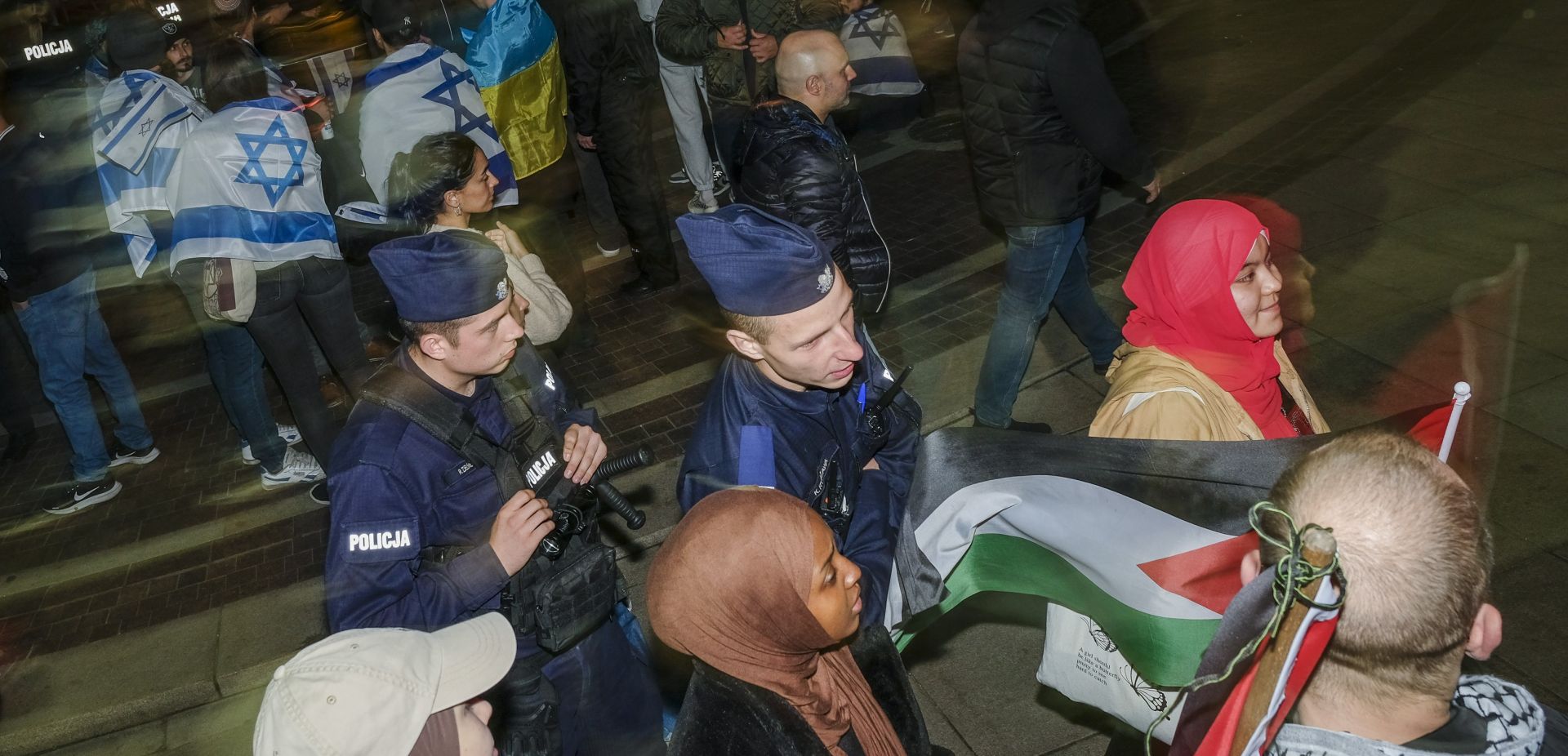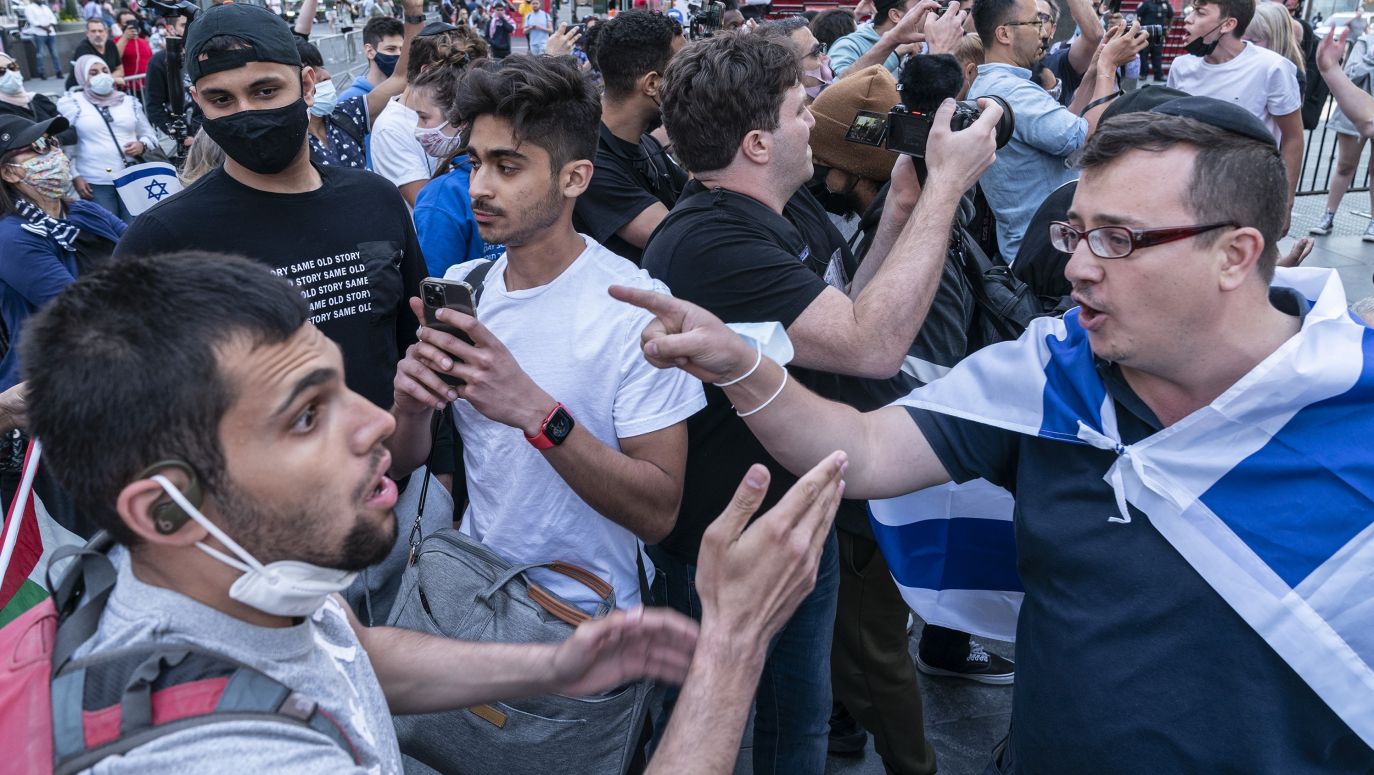Both groups believe in a Jewish or Palestinian story. These, regardless of momentary emotions, are the prism through which their perception of the world refracts. These stories are present in practically everything. The speeches of politicians and activists are merely their most visible manifestation. Probably also not the most important one, because politicians’ speeches are usually listened to by other politicians or those who would like to become them. The true story is shaped by ruins, excavations, music, tastes, smells, landscapes, plants...
Peace and freedom, idyll and hope
The Palestinian story can be well reconstructed by delving into the reading of a cookbook with the simple title
Palestine, published in 2020, also in Poland. It was written by Sami Tamimi, a Palestinian born in Jerusalem, a well-known London restaurateur and chef, who is the business partner of another renowned London chef and cookbook author, Yotam Ottolenghi, a Jew, also born in Jerusalem.
 SIGN UP TO OUR PAGE
SIGN UP TO OUR PAGE 
The mere juxtaposition of these two figures has narrative and political value. Here, a Jew and a Palestinian not only live in friendship but also work together. Their friendship is also manifested by co-creating a cookbook titled
Jerusalem, presenting their beloved hometown from a culinary perspective, where the bazaars and customs are more important to them than disputes over who owned the Temple Mount. It is easier for them because both are not religious and the stories from biblical times do not affect them directly, not to mention that both live in London, far from bombs, rockets, and knife attackers.
This friendship is the first and fundamental message of the Palestinian story, resonating very well in the post-religious and post-historical societies of the affluent West, where people cannot comprehend that one could fight over anything, valuing good food and a good mood.
For all who watched the broadcasts of the Hamas attack, this may seem hard to grasp, but the fundamental message in the book about Palestinian cuisine is peace and freedom. Amidst the thicket of fascinating culinary recipes, which are always placed in the natural context of daily life practices, the curious reader encounters stories about how Palestinians live, how they would like to live, and what hinders them in doing so.
For instance, the wall separating the Jewish part and the Palestinian part is described like this: “Israelis call it the security wall because it is supposed to protect them from Palestinian attacks. Palestinians, on the other hand, perceive the wall as a barrier that limits their freedom, prevents the free movement of people, and threatens the land where Palestinian farms stand and olive groves grow.”
It’s impossible not to notice that the threat which caused the wall to be built is of course mentioned, but the restriction of freedom and threat to the idyllically portrayed land seems much more important than it. Who among us will not daydream at the thought of olive groves, and who will not protest against the technocratic and political interference in this idyll embodied by the concrete wall, 12 metres high?
In the section about Nablus, a city that is dominated by sweets, and thus the reader of this book will remember it, the following sentence appears: “However, the city’s past is not easy; it suffered greatly during the second Intifada in 2002 and still struggles with Israeli occupation.”
If someone wanted to derive knowledge only from this book, they would not learn that the second Intifada involved carrying out hundreds of attacks, in which nearly a thousand innocent Jewish victims perished, and nearly three thousand Palestinians died in pacification actions, with the note that a large portion of them certainly were not innocent, as they were involved in the attacks. The victim here is the city, which suffered greatly and still struggles, but after all, one can eat the legendary dessert knafeh there, sip strong coffee, and feel the “caramel aroma of the heated syrup used in bakeries to drench the mild-flavoured curd cheese” wafting through the streets.
Again, the dissonance between the idyllic image of leisurely time spent over sweet pastry and thick coffee, and the ruthlessness of the oppressors is almost sensuously perceptible. A world of freedom and peace: of daily life, hard work, and small joys is set against a world of suffering, violence, and alienation.
Similarly, in the story about the initiative under the banner of Tent of Nations, operating near Bethlehem, which was conceived by a Palestinian family grappling with Israeli bureaucracy wanting to take their land. The family effectively halted this process in court and now conducts administrative proceedings (delayed in every possible way by officials), while simultaneously inviting groups and individual volunteers from the West, who can participate in harvests, help on the farm, or take part in workshops about peace and cooperation.
Their message is: “No one will force us to hate.” There is no talk about who is “forcing” to hate, but one thing is certain: this Palestinian family embodies a peaceful attitude towards the world and their neighbours. Another message, explicitly expressed in the text, is hope. This is the name of the daughter of the farmers described, studying international human rights law.
If someone asked me what this particular fragment has to do with culinary arts, I would not be able to answer. However, it certainly has a lot to do with the image of Palestine that the author and his publishing house would like to implant in readers: a community full of peace and hope.
Prison, persecution, killed children
However, it’s time for a stronger message about the oppression Palestinians face from Israel. It is brought by a passage about fishing, which serves as a pretext to describe the situation in the Gaza Strip. It contains a term that has made a great career in Western minds and literature: “It is one of the most densely populated places in the world. It is often called the largest open-air prison in the world.”
Recently, after the attack by Hamas, it was used by Harvard University professor Stephen Walt, a known representative of the “realist” school of thought on international politics. If both the author of a cookbook and a prominent political scientist from a renowned American university describe something in a similar way, it means that the narrative has been effectively implanted.
Thus, the story of peace, friendship, and hope ends, and the story of persecution begins, which – similarly, as in the cookbook – is carefully separated from facts regarding terrorism. One aspect of this story is quite shocking for a person educated and raised in Europe, and I wonder whether it would not be better for the Palestinians if it remained within the Arabic language and whether translating this message into English might not herald a process of undermining the positive image that – effectively – is shaped in Western minds – conventionally speaking – by all kinds of cookbooks.
It’s about a deeply anti-Semitic message, and not the kind that tries to nuance the description of the situation in Israel by honestly showing the mistakes and brutality of the local security forces, which Jews often take as a sign of anti-Semitism. No, this is about a message that Alfred Rosenberg would not be ashamed of: dark, venomous, dehumanising.
The film, which I will describe now, I watched many times, unable to believe its existence. It was shared by a Twitter account engaged in running a campaign against Israel. Its narrator is an Arab of charming superficiality, with a neatly trimmed black beard, a shapely head, and large, sincerely looking eyes, speaking persuasively, establishing a good connection with the viewer.
He answers the question of why the West supports Israel, which quickly turns into the question of why Western people want Jews to remain on the eternally Palestinian land, in Israel. He addresses the viewer wanting to build an intimate bond with them and convinces them that essentially, this viewer, a European, also hates Jews, just like the narrator.


 SIGN UP TO OUR PAGE
SIGN UP TO OUR PAGE 




